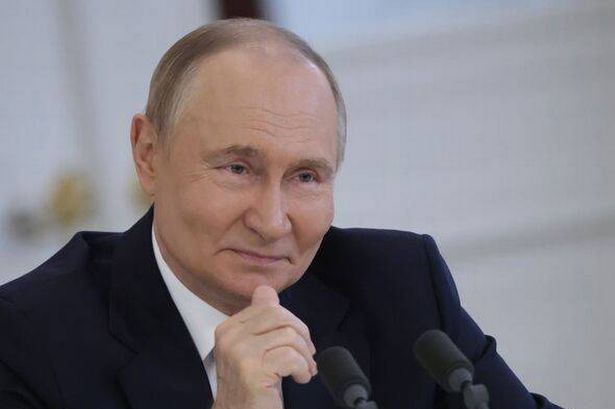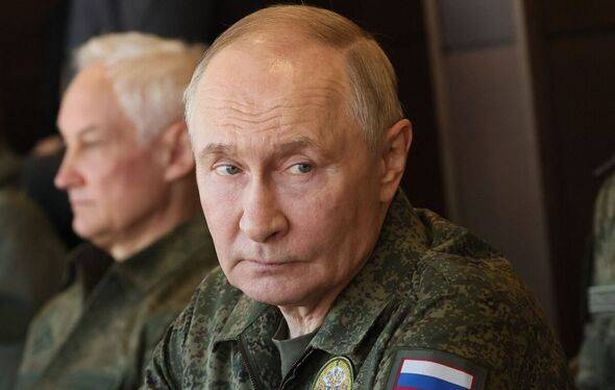Russian President Vladimir Putin has warned that the end of the last US-Russia pact limiting nuclear weapons could trigger an arms race

Russian President Vladimir Putin has laid a nuclear gauntlet down to the United States(Image: Getty)
Vladimir Putin has issued a stark warning that the collapse of the final US-Russia nuclear weapons agreement could spark a dangerous arms race. Meanwhile, brewing global tensions are fueling worries about a worldwide conflict, with many people anxious about an armed conflict.
The Russian leader announced on Monday (September 22) that the Kremlin will maintain nuclear arms restrictions for another year. He called on the White House to do the same.
He warned that scrapping the 2010 agreement would be destabilizing and might accelerate nuclear weapons proliferation, with World War 3 fears surging following Europe scrambling fighter jets to intercept a Russian spy plane in recent days.
Putin stated: “To avoid provoking a further strategic arms race and to ensure an acceptable level of predictability and restraint, we believe it is justified to try to maintain the status quo established by the New START Treaty during the current, rather turbulent period.”

Putin warns the end of a Russia-US pact limiting nuclear weapons could trigger an arms race(Image: Getty)
Speaking on Russian television, Putin revealed Moscow is ready to continue following the key provisions of the New START Treaty for one year beyond its February 5 expiration date next year.
The Russian leader emphasized: “We believe this measure will only be viable if the United States acts in a similar manner and does not take steps that undermine or disrupt the existing balance of deterrence potentials.”
New START was inked by former US President Barack Obama and his Russian counterpart at the time, Dmitry Medvedev. The treaty caps each nation at a maximum of 1,550 deployed nuclear warheads and 700 deployed missiles and bombers.
The agreement also included extensive on-site inspections to verify compliance, though these were suspended in 2020 due to the Covid pandemic and remain on hold. In February 2023, Putin put a halt to Moscow’s involvement in the treaty, stating that Russia couldn’t permit US inspections of its nuclear sites while Washington and its NATO allies openly expressed their aim was to see Russia defeated in its war with Ukraine.
However, Russia has stressed it wasn’t completely pulling out from the pact and committed to adhere to the limits on nuclear weapons set under the treaty as well as continuing to inform the US about ballistic missile test launches.
Another nuclear arms agreement between the US and Russia was terminated in 2019. The 1987 Intermediate-range Nuclear Forces Treaty had prohibited land-based missiles with a range between 310-3,400 miles (500-5,500km).
Daryl G Kimball, Director of the US-based Arms Control Association, hailed Putin’s statement on X as “an important and positive move”.
Earlier this month, Mr Kimball stated: “More nuclear weapons will not make anyone safer. By agreeing not to exceed the current strategic nuclear limits, they could reduce tensions, forestall a costly arms race that no one can win, create diplomatic leverage to curb the buildup of China’s arsenal and buy time for talks on a broader, more durable, treaty.”
US President Donald Trump revealed that he and Putin discussed nuclear weapons during their summit in Alaska in August.
When asked to comment in July on the impending end of New START, Mr Trump pointed out “that is a big problem for the world, when you take off nuclear restrictions”.
Putin directed Russian agencies to keep a close eye on US activities, especially regarding strategic offensive weapons, including preparations for American deployment of weapon interceptors in space.
He stated: “The practical implementation of such destabilising actions could undermine our efforts to maintain the status quo in the strategic offensive arms sphere.”
He added that in such a case Russia “will respond accordingly”.
He stressed that Russia’s adherence to the treaty’s restrictions could help strategic talks with the US, provided other steps were taken to improve relations between the two nations. (The Mirror US)